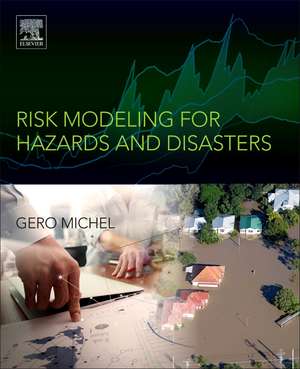Risk Modeling for Hazards and Disasters
Editat de Gero Michelen Limba Engleză Paperback – 30 aug 2017
Risk Modeling for Hazards and Disasters instructs readers on how to assess, price and then hedge the losses from natural and manmade catastrophes. This book reviews current model development and science and explains recent changes in the catastrophe modeling space, including new initiatives covering uncertainty and big data in the assessment of risk for insurance pricing and portfolio management. Edited by a leading expert in both hazards and risk, this book is authored by a global panel including major modeling vendors, modeling consulting firms, and well-known catastrophe modeling scientists.Risk Modeling for Hazards and Disastersprovides important insight into how models are used to price and manage risk.
- Includes high profile case studies such as the Newcastle earthquake, Hurricane Andrew and Hurricane Katrina
- Provides crucial information on new ideas and platforms that will help address the new demands for risk management and catastrophe risk reporting
- Presents the theory and practice needed to know how models are created and what is and what is not important in the modeling process
- Covers relevant new science in risk modeling, indirect losses, assessment of impact and consequences to insurance losses, and current changes in risk modeling practice, along with case studies
Preț: 473.64 lei
Preț vechi: 608.44 lei
-22% Nou
Puncte Express: 710
Preț estimativ în valută:
90.65€ • 94.28$ • 75.97£
90.65€ • 94.28$ • 75.97£
Carte tipărită la comandă
Livrare economică 06-20 martie
Preluare comenzi: 021 569.72.76
Specificații
ISBN-13: 9780128040713
ISBN-10: 0128040718
Pagini: 338
Dimensiuni: 191 x 235 x 20 mm
Greutate: 0.68 kg
Editura: ELSEVIER SCIENCE
ISBN-10: 0128040718
Pagini: 338
Dimensiuni: 191 x 235 x 20 mm
Greutate: 0.68 kg
Editura: ELSEVIER SCIENCE
Cuprins
SECTION I: Catastrophe Models, General Concepts and Methods
1. Quantifying Model Uncertainty and Risk
Nilesh Shome, Mohsen Rahnama, Steve Jewson, and Paul Wilson
2. What Makes a Catastrophe Model Robust
Jay Guin
3. Towards a more Dynamical Paradigm for Natural Catastrophe Risk Modelling
David Stephenson, Alasdair Hunter, Ben Youngman, and Ian Cook
4. Empirical fragility and vulnerability assessment: not just a regression
Tiziana Rossett and Ioanna Ioannou
SECTION II: Model Creation, Specific Perils and Data
5. The use of historic loss data for insurance and total loss modelling
James Daniell, Friedemann Wenzel, and Andreas Schaefer
6. Indirect Loss Potential Index for Natural disasters for National and sub-national analysis
James Daniell, Bijan Khazai, Friedemann Wenzel
7. Probability gain from seismicity-based earthquake models
Kristy Tiampo, Robert Shcherbakov, and Paul Kovacs
8. Big data challenges and hazards modelling
Kristy Tiampo, Seth McGinnis, Yelena Kropivnitskaya, Jinhui Qin, and Michael Bauer
9. Progress towards hyper-resolution models of global flood hazard
Paul Bates, Jeff Neal, Chris Sampson, Andy Smith, and Mark Trigg
SECTION III: Model Insurance Use-Cases
10. Insurance Pricing and Portfolio Management using Catastrophe Models
Helena Bickley and Gero Michel
11. Portfolio Optimization Using Catastrophe Model Results, a Use Case from the Insurance Industry
Augustin Yiptong and Gero Michel
SECTION IV: Model Risk, Resilience and New Concepts
12. Parsimonious risk assessment and the role of transparent diverse models
Patrick McSharry
13. Creating a Probabilistic Catastrophe Model with the Characteristic Event Methodology
Karen Clark
14. From Risk Management to Quantitative Disaster Resilience: A New Paradigm for Catastrophe Modelling
Slobodan Simonovic
15. Beyond ‘model risk’: a practice perspective on modelling in insurance
Andreas Tsanakas and Laure Cabantous
1. Quantifying Model Uncertainty and Risk
Nilesh Shome, Mohsen Rahnama, Steve Jewson, and Paul Wilson
2. What Makes a Catastrophe Model Robust
Jay Guin
3. Towards a more Dynamical Paradigm for Natural Catastrophe Risk Modelling
David Stephenson, Alasdair Hunter, Ben Youngman, and Ian Cook
4. Empirical fragility and vulnerability assessment: not just a regression
Tiziana Rossett and Ioanna Ioannou
SECTION II: Model Creation, Specific Perils and Data
5. The use of historic loss data for insurance and total loss modelling
James Daniell, Friedemann Wenzel, and Andreas Schaefer
6. Indirect Loss Potential Index for Natural disasters for National and sub-national analysis
James Daniell, Bijan Khazai, Friedemann Wenzel
7. Probability gain from seismicity-based earthquake models
Kristy Tiampo, Robert Shcherbakov, and Paul Kovacs
8. Big data challenges and hazards modelling
Kristy Tiampo, Seth McGinnis, Yelena Kropivnitskaya, Jinhui Qin, and Michael Bauer
9. Progress towards hyper-resolution models of global flood hazard
Paul Bates, Jeff Neal, Chris Sampson, Andy Smith, and Mark Trigg
SECTION III: Model Insurance Use-Cases
10. Insurance Pricing and Portfolio Management using Catastrophe Models
Helena Bickley and Gero Michel
11. Portfolio Optimization Using Catastrophe Model Results, a Use Case from the Insurance Industry
Augustin Yiptong and Gero Michel
SECTION IV: Model Risk, Resilience and New Concepts
12. Parsimonious risk assessment and the role of transparent diverse models
Patrick McSharry
13. Creating a Probabilistic Catastrophe Model with the Characteristic Event Methodology
Karen Clark
14. From Risk Management to Quantitative Disaster Resilience: A New Paradigm for Catastrophe Modelling
Slobodan Simonovic
15. Beyond ‘model risk’: a practice perspective on modelling in insurance
Andreas Tsanakas and Laure Cabantous
